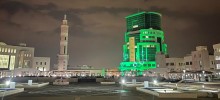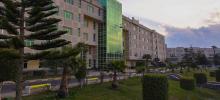450 hospitals containing 70 thousand beds, 67 thousand doctors and 130 thousand nurses in Saudi Arabia.

Currently, Saudi Arabia owns 450 hospitals distributed in all regions of the Kingdom, where 70 thousand beds are available, and 67 thousand doctors work at work, with 10 thousand pharmacists, and 130 thousand nurses, in addition to more than 70 thousand persons in assistant services. The percentage of resettlement in these areas has reached 21% in medicine, 31% in nursing, and the proportion of resettlement in assistant services was 70%, in addition to 20 medical cities and university hospitals. The first day of the Conference of Health Systems " Concept and Message " organized by King Khalid University (KKU), was opened and was held in Abha Palace Hotel, in Abha, during the period from 21 - 22 of this month. The conference was for four sessions, presented by nine speakers, from inside and outside the Kingdom.
The first session included a talk about strategic planning for university hospitals. The session was co chaired by Prof. Dr. Khaled Al Jalaban, and Professor Khaled Abd Al Rahman - the Professor of Family Medicine and Medical Education at Imam Muhammad bin Saud University - who participated with a lecture about the strategic planning for university hospitals and its importance in the Kingdom.
The Consultant of Medicine from the Ministry of Health, Dr. Abdul Rahman Al Naim, also participated with proposals about the possibility of transforming the health service systems of care for patients to care for the healthy to prevent illness, citing that diabetes, which has reached 22%, and obesity, which is considered one of the causes of diabetes exceeded 50%, indicating that the priority shall also be for the healthy not the patients alone.
The second session included two lectures, with Dr. Eric de Rodnbug, from France, started the session by talking about the different systems of university hospitals, related to governments, and a detailed plan for making decisions. He also presented the types of approved health systems in some of the world hospitals, and how to take decisions in these systems.
Shihan Emilio Williams, the Director of Quality Programs in the Faculty of Medicine in Chicago, in America, presented the strategic planning mechanism, and the management of the academic health centers in the future, as well as how to provide health care to communities and patients with a focus on sectors with special needs, which is women, children and old people.
In the final sessions of the first day that discussed the quality of health services and scientific research hospitals in the university, Dr. Kevin Cook, from Posten, in America University, talked about the development and the role of Academy health centers in the movement of development, and moving from quantity to quality, as he discussed the medical education center at the University of Mississippi in America and its customary role, and how to change its economy, and to change its role in health care, as well as its strategies, in addition to the role of technology in this shift for health systems.
The Director of the Quality of Programs in the Faculty of Medicine of Chicago in America, Dr Williams, stressed the importance of patient care, the importance of education and scientific research, and their impact on society, on the nation, and the world, through these health systems.
The Participant Doctor in Medicine of embryos and stem cells, Abdullah Al Dahmash, from King Saud University stressed on the importance of medical research in universities in the world, demanding the to intensification of scientific research in Universities because of its importance in raising the health care and medical service for patients in the national hospitals in the kingdom.









